1965: Eleanor Parker in "The Sound of Music"
 Thursday, September 24, 2020 at 10:15AM
Thursday, September 24, 2020 at 10:15AM Each month before the Smackdown, Nick Taylor chooses three performances to highlight that weren't Oscar-nominated...
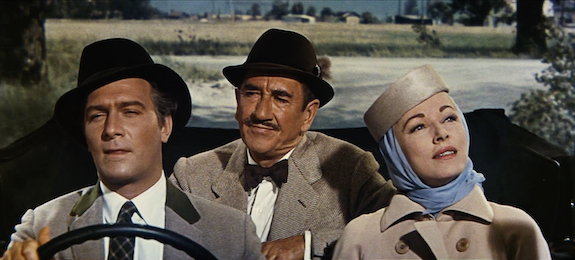
“And Eleanor Parker as The Baroness” reads the final casting credit of the opening credits of The Sound of Music. Hers is the only name that appears by itself, positioning the character and the actress as events the film wants you to eagerly anticipate. Hard enough when you're the other woman in a love triangle, especially as a non-singing role in a three-hour musical. Yet Parker, boasting one of the most exciting, chameleonic personas in American cinema, lives up to the hype over fifty years later, emerging with the film's most multifaceted performance.
Baroness Elsa von Schraeder won’t appear until roughly an hour into The Sound of Music, by which time we’ve already watched the indomitably energetic Maria (Julie Andrews) enter the Von Trapp family at the direction of her Abbess, instructing her to work as a governess to see if it’ll suit her better than being a nun...
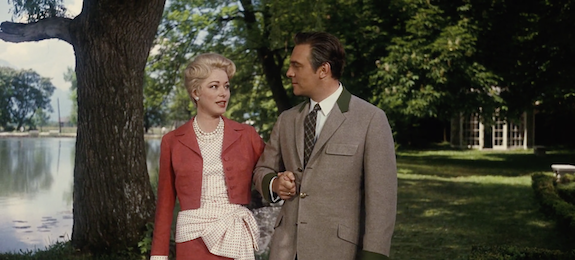
The head of the household is Captain Georg Von Trapp (Christopher Plummer), who has raised his seven children with military strictness since his wife died years ago. His hiring of Maria occurs before his latest romantic voyage to see the Baroness in Vienna, intending to finally bring her home with him to Vienna and meet his family. The film quickly establishes the Captain as an intimidating, unhappy, temperamental figure, having exorcised all music and joy from his life. So what kind of woman might we expect to return with him? Who would complement a man like Georg, and how will she respond to Maria and the Von Trapp children?
The Baroness drives into Salzburg with Georg and their friend Max (Richard Haydn), wearing a glamorous yet understated outfit, the elegance of her wardrobe contrasting nicely with the often heavy fabrics and drapery of Maria’s clothes. She looks like she’s basking in the beauty and newness of the landscapes, at finally getting to see the Captain in his natural habitat, just as Ted D. McCord’s camera basks in Parker’s beauty and bonafide star charisma. Georg is a much warmer, emotionally accessible man when he’s with Elsa, and she in turn is every bit as open and witty as he is. They immediately establish the chummy, aristocratic camaraderie and genuine infatuation of many a Golden-Age Hollywood film couple, though both actors go the extra mile to convey a bone-deep sorrow that’s instrumental to their bond. Both characters describe their relationship as a life-raft after their partners died. Parker’s sadness is especially captivating, taking on a brittle, knowing texture and conveying an intense awareness of herself and the world around her. She also shows Elsa is more sensitive to shifts and stillnesses in their relationship than Georg is: when she asks what she means to him, she chuckles to herself at his barrage of compliments both for his earnestness and because she’s aware he’s not answering her implicit question of when he’ll propose.
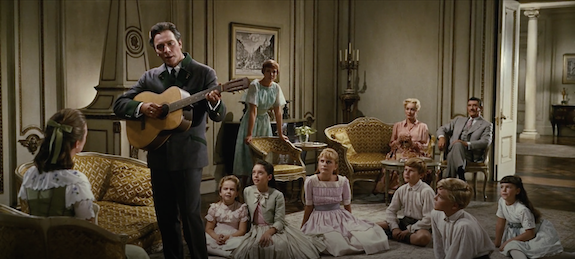
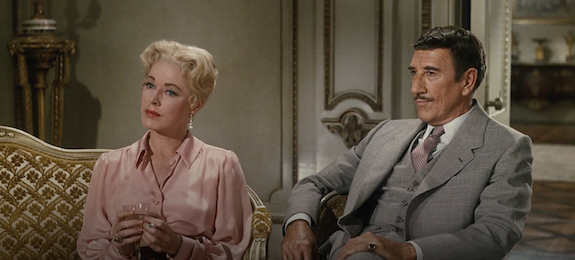
Elsa does not automatically assume Maria to be a rival for Georg’s heart, though meeting a woman as she falls out of a canoe isn’t a great first impression to gauge that sort of thing. The whole thing plays as very silly for Elsa, cat-grinning in amusement. But she does grasp that Maria has gotten along tremendously well with the Von Trapp kids, and is less amused by the anger their antics bring out in Georg. Parker doesn’t get to articulate any of this verbally, let alone in close-up. The Baroness is subject to some of director Robert Wise’s most unique blocking and framing, sometimes shot in close-up and sometimes with her back facing the camera, leaving her face completely obscured. Much like last month’s Oscar/Smackdown winner Fay Bainter in Jezebel, Wise continuously puts Parker in the foreground of scenes that aren’t focused on her character (Dorothy Jeakins’ stunning costumes also help draw our eye to her). The filmmaking frequently signals us to look in her direction, and Parker uses her marvelously expressive face to do the heavy lifting of guiding us through the film’s many musical performances and impactful conversations, showing us a Baroness who is absolutely charmed by the music bursting throughout the house but is perhaps more savvy than Georg and Maria are at recognizing the growing love between them. You could look at her face in any given scene and know exactly how that relationship is progressing.
Just as affecting as these understated Face Journeys are the moments when Parker drains her face, keeping that cat-grin up without indicating her own intentions. She is, surprisingly, at her most inscrutable in her conversations with Max, looking her loosest and most comfortable in his confidences even as she refuses to clarify whether she’s taken or annoyed by his jokes about her being a gold digger, or if her barb about sending the kids to boarding school is a serious thought or venting off steam. At the very least, she and Wise refuse to use these passages as an easy out to vilify the Baroness. We never doubt she loves Georg, and her perspective is treated with remarkable complexity and generosity.
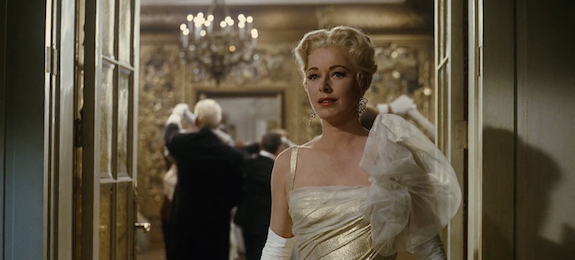
All of this means that when Elsa tells Maria that Georg is in love with her, and that Maria in turn loves him back, it's played too delicately by the actors and director to be labeled as a confrontation. Andrews, marvelous throughout, looks genuinely caught off her guard at having been recognized in this way, too terrified of her own emotions to do anything but run. Parker looks decidedly mournful herself, her faux-pleasantness and eternal poise barely masking her anxiety. Their conversation plays as a last-ditch attempt by the Baroness to stop herself from becoming the other woman in someone else’s love story, whose only solution is to get Maria to bail before Georg can grasp his own feelings. One can only imagine how victorious it must feel to end Act One dancing with your beloved in a shimmering, golden dress after sending off a rival for his affections, but Parker and Wise make this sight all the richer for imbuing Elsa with a real sense of poignancy. Maria leaving doesn’t feel good, even if it keeps Georg with her a little longer.
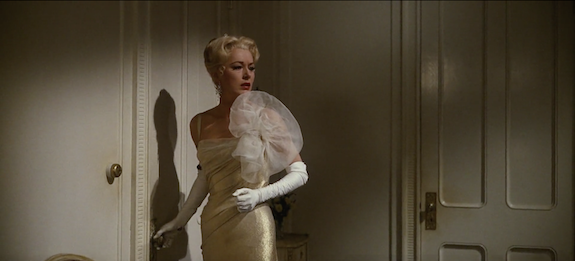
Act Two, on the other hand, quickly undermines Elsa’s victory. We see her playing some ball game with the Von Trapp kids, doing a test run of the whole “motherhood” thing. Her gigantically nervous reactions whenever the ball comes near her are comically overscaled but pitifully appropriate to the children’s bullying. Soon after this ordeal Georg announces that the Baroness will be the children’s new mother, and the cold dissatisfaction radiating off the Von Trapp kids is overwhelming. As sincere as their love is, everything about this arrangement feels off-key even before Maria returns to the villa. Elsa surely knows what will happen next once Georg asks Maria if she’ll be staying for good - when she meets him on the balcony that evening her talk about potential wedding gifts for each other and honeymoon destinations sounds affected, scaling herself slightly bigger than normal, as though she’s trying to stave off this inevitable disappointment by willing their love into being. And yet, when he starts calling it off, Elsa interrupts him to say her own goodbye rather than hear him end it. Maintaining her composure without disguising her feelings of dejection and resignation, Elsa tells the Captain that she cannot stay with him, that she needs a man who needs her desperately ("Or at least needs my money desperately," she says with some bitterness). She gives her blessing for him to be with Maria, gives him a kiss on the cheek, and leaves.
Parker plays this interaction on the verge of tears, yet we never doubt that the Baroness will walk away from this heartbreak just fine in the end. It takes an astonishing amount of clarity to convey her sorrow while still showing how much Elsa still treasures their relationship, even as it fades away. Nor does she once point any ill will at Maria. Parker's last scene is as much a tribute to Wise's lavish attention and the character's self-assuredness as to her porcelain, carefully contained work. Yet, for all The Sound of Music's immortal elements - the majesty of its construction, the durability of its songs, its perfect leading players - I don't know how anyone could watch Parker and think it's not her movie.
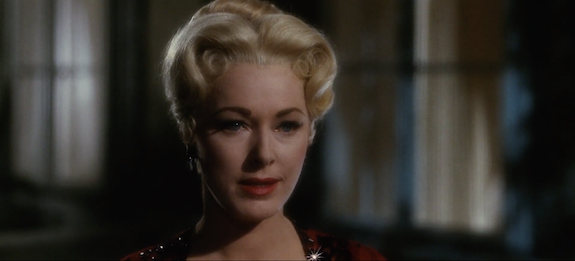



Reader Comments (34)
For me, hers is the best acting of the entire movie. She conveys so much with her face and with deliberate inflections in her voice. A marvel of a performance.
Great article.
You touched on the vilification of the character some. Watching this as a kid, you just inherently know "she's not the right one" and can't help but vilify her some just because of that. It took reaching adulthood to realize that Elsa hasn't done anything wrong, is trying her best and seems a decent woman all around.
There's a contingent of similar roles -- including Elaine Hendrix in Parent Trap and Idina Menzel in Enchanted -- of "wrong women for the right guy" that I think people are only now realizing they identify with more than the actual protagonists. (I mean, I love Amy Adams in that role, but I relate more to a laid-back chick trying to take things slowly with a guy and his daughter than a literal cartoon princess.)
@Pedro - She’s just wonderful. Amazing to think the same actress pulled off the leading role in Caged so powerfully.
@James from Ames - Elaine Hendrix was *exactly* who I was thinking about when I touched on that. Granted, I think Hendrix is leaning into being the “wrong” woman - that relationship never made sense to me - and Menzel’s just kinda bland? Parker feels like a real woman and a totally credible romantic option in her own right the moment we see her. You really get what they need from each other, even as it’s clear they aren’t going to work out once the Captain falls for Maria. A paragon of this kind of role.
I've seen this movie a zillion times, and I don't agree with Nick's take at all. It's not Parker's fault, but I think the Baroness is set up as a cardboard character, a clear villainess. I do agree with the last paragraph, i.e. only in the last scene do we get a sense that she is not a manipulating gold digger. But by then it's too late, and the final grace note Wise gives her character comes off as false.
LOVE her in this. I think it's a real fight for the best performance in the film (with Andrews) and that's really saying something.
She's glamourous and fabulous throughout.
Justice for the Baroness! YES. I love going to sing along sound of music screenings, but I loathe and abominate the audience tradition of hissing at everything she does. It is such a betrayal of this great performance.
@Nick T -- admittedly, I project more of Idina's real-life persona onto that character because her Nancy character was written as so boring. Because what the hell kind of person casts Idina Menzel in a musical two years after Wicked and doesn't let her sing?
Excelent contribution, Nick. I fully agree. I am sorry voters chose to nominate Peggy Wood and not Parker.
Side note: I was deeply moved by Angela Cartwright's performance as Brigitta. The way she cries when her father is singing Edelweiss breaks my heart every time.
Doesn't her character have a song in the play that was cut for the movie? Parker was a very talented singer herself so that seems puzzling. She was dubbed in Interrupted Melody but she was actually singing while the film was shot so the breathing would match up. She had opera level talent.
Some time ago the internet created a letter from the Baroness to her wedding guests explaining why the wedding was off. It's from her point of view and so shady and funny.
It's hard not to pitch Maria and the Baroness against each other for the viewers affections, but I think you hit on all the things Parker does right. It's easy to see a lesser actress play her as a viper, and she never does that. The pain and emotion that feels, a bit of emotional unsureness, resonates throughout and really humanizes her. As a kid watching this film I never hated her like others, she just seemed intriguing and fun to watch.
Has a performer ever been Oscar-nominated for a non-singing role in a musical?
She should have been nominated as BSA instead of Peggy Wood.
Joe G - I don't think Gladys Cooper sings in My Fair Lady
Love this piece. And I'm with James about needing to reach adulthood to understand and appreciate Elsa. As a kid, I *of course* was rooting like mad for Maria and saw the Baroness as the cold, uncaring stepmom-to-be who needed to be out of the picture. The movie definitely sets them up that way.
But Parker subverts the archetype so skillfully that even as a kid, I appreciated Elsa's poise and graciousness in ceding the field. She's calculating but not heartless, and ultimately a class act (in all senses).
As I grew older and realized I had no affinity for children or motherhood, I moved pretty much 100% on to Team Elsa but only in the sense that she was better off not marrying Georg and getting saddled with 7 kids. I imagine her drinking a perfect cocktail somewhere in post-WWII Monaco and living her best life.
@Joe G, just off the top of my head, Amy Irving in Yentl and Gladys Cooper in My Fair Lady were nominated for musicals where they didn't sing. I'm sure there must be many others.
I just want to compliment Nick on the quality of his writing. Eleanor Parker's admirable acting skill is beautifully described. Well done!
Btw. Did you happen to see Laura Benanti's version of the Baroness in the televised "Sound of Music"? Benanti had a more sardonic tone than Parker.
Why they chose Peggy Wood for Supporting over Eleanor Parker I don't know. Singing in high key? This should have been the one to win Parker the Oscar. Elegant, savvy, melancholy.
@Joe G - Gladys Cooper as Mrs Higgins in My Fair Lady comes to mind as a nominated non-singer in a musical.
I think one of the things the movie does to improve on the stage show is removing the Baroness' and Max's songs. It really is a flawless adaptation.
@dtsf - Interesting! I see Parker and Wise courting that cardboard villainess but fully subverting it, and I’d argue she “adds” more than the other actors. What do you think of the film overall?
@Schmeebs, Gary, and forever1267 - Exactly!
@chasm301 - I definitely feel like I heard about this performance as some kind of glacial diva or whatever but she’s totally doing way more than that.
@James - So nuts! At least Marsden has that gag where he keeps getting cut off. Might’ve been fun to see a duet between him and Menzel at the end.
@Marcos - All the Von Trapp kids are so good!
@Tom G - Guess I’m gonna go hunt down that letter! Watched the movie with a friend and he was saying how lucky Georg was that she decided to leave gracefully since she could *clearly* make life hell for him if she wanted to, and I definitely agree.
@Joe G - Aside from the folks already mentioned (thank you ken s and Pat!), Jean Hagen in Singin’ in the Rain is the only one I can readily think of. I was thiiiis close to saying Marisa Berenson for Cabaret, but, fuck!
@Lynn - Thank you! I feel like a got a lot more out of her work as an adult too. She absolutely dodged a bullet, though it says a lot that she even considered raising seven kids to get with Plummer. What a guy.
@LadyEdith - Thank you too!! I did not see her, but I usually like Benanti a lot and should probably check that out.
Also! Now that we got this category’s obvious omission out in the open, anyone have any favorites from this year they wanna stan for?
I also don't get the academy's passing over Parker—who'd been nominated before, for god's sake—in favor of Peggy Wood's perfectly fine but not terribly distinctive performance. I really wonder if they felt like they should honor the nuns in some way. Boo on you, academy!
Eleanor earned my vote during the Captain singing ‘Edelweiss’ scene. The look on her face when the Capt. sings ‘you look Happy to see me’ while nodding pleasantly to Maria, In an instance, the Baroness knows that the Capt. is smitten and she is out of place in this (non-harmonica) musical family. It’s also heart-breaking when she notices the pair dancing and when she talks to Maria before Maria bolts from the estate. Finally, the Baroness and the Capt. talking on the balcony in their ‘Farewell’ while lovely Maria is down in the garden....
I want to think that Peggy Wood was nominated because she was the ‘good’ Mother Superior while Eleanor was perceived as the kid-hating, ‘evil other woman’ standing between the lovebirds. ((Considering that Gladys Cooper was nominated the year prior for My Fair Lady, I kind’ve wished she might’ve tackled/was offered this role-could she singed or perhaps she could’ve pulled Marni Nixon from her Abbey duties. Seeing her Gladys was the Mother Superior from Hell in The Song Of Bernadette, it would’ve been great to see her now as the Mother Superior from Heaven). Anyways, can’t speak for the Othello pair that got nominated, but Ruth Gordon as a loony tunes mother of Daisy Clover isn’t that compelling. So-Eleanor, to me, your performance is unappreciated and great!
She should have won, and Christopher Plummer should've been nominated!
I'm sure I've seen this movie more times than any other movie, and as the years go by, you really appreciate Eleanor Parker even more. Sure, she might not have been the best mother for those kids, but honestly? She might have made a better match for the Captain himself, particularly if they didn't all live in a musical but rather in something closer to real life.
The way it's handled is that the Baroness is contemplating the Captain as her second husband, not as a lovey-dovey replacement for her first husband (she was married before right?). Whereas Christopher Plummer and Julie Andrews seem hell bent on having that "first love" sort of feeling all over again. 35 Going On 17? ;-) The Baroness is just over that sort of nonsense.
And the Baroness' big dastardly deed of getting rid of Maria that first time? Well duh, of course she should have. Maria claims to want to be a nun, and she's merely pointing out that she's not being very nun-like gaping all over the Captain like she is. She didn't lie about anything at all, just told the truth about what she saw going on.
I really, really hope the Baroness followed the Captain's example and loaded up her Rolls Royce for a war-long vacation in Monte Carlo, with or without her little toady Max.
How she ever missed out on an Oscar nom is beside me. I guess she made it all look too easy.
Wonderful look at a too often overlooked piece of work!
I'm a huge Eleanor Parker fan and have managed through time to see her complete filmography (even the obscure and bizarre Eye of the Cat-a wild mess of a movie where she has a great time going over the top-SEE it!) and this is one of her very best performances.
The ironic thing about her exclusion is that when people talk about the film now they rarely talk about the Abbess but nearly everyone mentions the Baroness and how fabulous both the character and Eleanor Parker are.
With how fantastically popular the film was and the way the Academy ladled nominations on the picture it's baffling how she was excluded, particularly considering at the time the film was cast (before Mary Poppins was released) she was the biggest name in the cast. Even taking into account by the time nominations came around Julie was in that position Eleanor's reviews had been good, and she could have fit into an overdue narrative having four nominations to her credit but no win, so perhaps they decided to reward the "good" Peggy Wood rather than the perceived villainess (though I agree she's not that at all, just not suited to be Captain von Trapp's wife).
She'd be my winner had she been nominated.
By the way my alternate lineup to what we have would be:
Claire Bloom-The Spy Who Came in from the Cold
Barbara Harris-A Thousand Clowns
Vivien Leigh-Ship of Fools
Eleanor Parker-The Sound of Music-Winner
Maggie Smith-Young Cassidy-I know she's nominated for Othello but I thought she was more interesting here.
Wood had the nun’s role and the rest is history, but beautiful Parker had a much more interesting role and she valorised it with her grace and talent.
I mean, she's good in this and all but I don't know that she deserved a nomination. I have to mostly agree with dtsf - although I did enjoy her performance as the intrigant and I do think the character was written well.
If you replaced her with Peggy Wood, she'd still be 5th for me in that lineup.
I love this article and I love this performance. I think it's one of the best things about The Sound of Music that it allows the Baroness such dignity, through Eleanor Parker's beautiful performance. I think she deserved to win and it's a shame she wasn't nominated here (though she did receive three nominations earlier in her career).
If you consider A Star Is Born a musical, there's that Best Actor nomination for James Mason.
I thought I enjoyed Parker more than Wood til I revisited the film. Both great performances though.
i like to think elsa and max teamed up after the war and were the prototype for will & grace's karen and jack
She's terrific in this. She offers so much that's not in the script to make the Baronness a fully well-rounded character. She's absolutely not a true villainness, because she doesn't do anyting really vicious to anyone. But she's considered as such by most, not because how bad she is, but because how lovable Maria is.
As much as I like her in this, nobody comes close to Julie in this movie. What she does in this film is make a bona-fide miracle. That rarely happens in a movie.
Should've walked away with the win easily. Three wonderful lead nominations and this showcase supporting role as a perfect last hurrah and win. Or so it should have been. Heck, i'd even allow Sound of Music to be the double noms in this category this year.
A maddening snub, but she was too glamorous, made the nuanced role look easy and not having a musical moment must've hurt.
I totally thought this was a Claudio Almost There piece until the comments. So the highest of compliments to you Nick T!
Parker is good in the film but the Baroness and Max are more complex in the Broadway musical and they do sing too
great